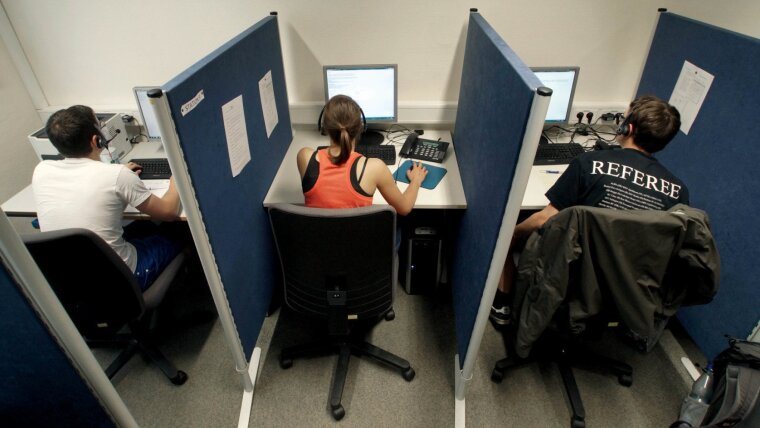
If the general election were held this Sunday, which party would you vote for? Where do you stand on the expansion of wind power? How do you invest your savings? The aim of empirical social research is to find out what people think about current affairs and how they form their opinion. But how do researchers get hold of this often extremely private information? Most of the time, they just get on the phone.
»Good evening. We’re carrying out a study. Do you have time to help?« This is how pollsters tend to start their calls to collect data, which they usually do in the evening. Telephone surveys are essential for sociologists, as they provide the basic data required for empirical social research. Over the past 15 years, the Friedrich Schiller University Jena has been running its own laboratory for computer-assisted telephone interviewing (CATI). Up to 20 student assistants can be on the blower at the same time in the two rooms, making calls in the name of research.
»Our surveys are often part of larger research projects,« explains Thomas Ritter, the head of the institution. »Our most elaborate project is definitely the Thuringia Monitor, which maps the political views of the people of Thuringia each year, and for which we conduct over a thousand interviews«.
Dialled numbers from randomly generated samples
The CATI laboratory is not only used by researchers in the field of social sciences, but also in economics and communications research. Thomas Ritter and his colleagues not only provide the infrastructure; they also give advice on the feasibility of projects. »We bridge the gap between theory and practice: I calculate the approximate expenditure and time required, and I also offer tips on the structure of surveys,« says Ritter. In addition to research projects, the telephone laboratory is also used intensively in teaching. Students often develop their own empirical research questions in seminars, designing a survey and eventually picking up the phone themselves.
Whether for a research project or seminar work, an interview always starts with a telephone number. But how do interviewers decide who to call? »They don’t,« says Thomas Ritter. Instead, researchers obtain numbers from GESIS – Leibniz Institute for the Social Sciences, which acts as a kind of service provider for research projects in the field of social sciences. GESIS in turn obtains the numbers from the Federal Network Agency and randomly generates samples for the interview laboratory.
»We only find out who the numbers belong to when we dial them,« says Thomas Ritter. But first they have to pick up. After all, not everyone who is called takes part in the survey. »An interviewer will typically dial around 100 numbers every five hours, which results in about five interviews, during which the preset survey is displayed on their monitor,« says Ritter. Institutions like the CATI laboratory are facing a growing problem that is making surveys significantly more difficult: »There are fewer and fewer landlines these days. Young people in particular only use mobile phones and are more difficult to contact. It also makes it harder to conduct surveys for one specific region, such as in the case of the Thuringia Monitor,« explains Ritter.
These are just some of the reasons why the CATI laboratory needs a technical revamp in the near future to make it more modern. Another essential ingredient for the laboratory’s success are the student assistants, most of whom study a subject related to social sciences and therefore know exactly what is required of them. Thomas Ritter has no worries about finding young talent. »We always welcome applications.«
By Sebastian Hollstein